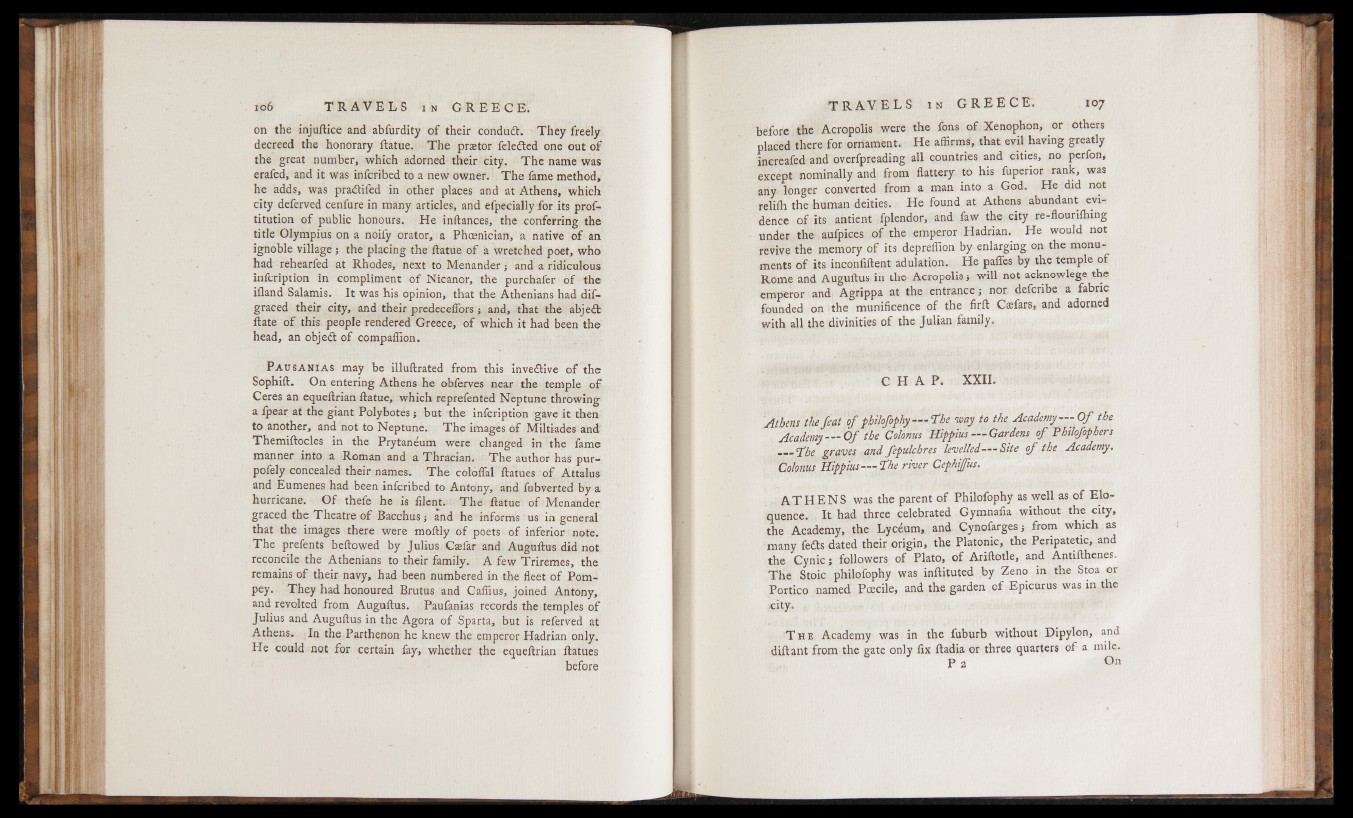
on the injuftice and abfurdity o f their condudri They freely
decreed the honorary ftatue. The praetor fele&ed one out o f
the great number, which adorned their city. The name was
erafed, and it was infcribed to a new owner. The fame method,
he adds, was pradtifed in other places and at Athens, which
city deferved cenfure in many articles* and efpecklly for its prof-
titution of public honours. He inftances, the conferring the
title Olympius on a noify orator* a Phoenician, a native of an
ignoble village; the placing the ftatue o f a wretched poet, who
had rehearfed at Rhodes, next to Menander; and a ridiculous
infcription in compliment of Nicanor, the purchafer of the
ifland Salamis. It was his opinion, that the Athenians had-dif-
graced their city, and their predeceflors j and, that the abjedfc
ftate of this people rendered Grdecei o f which it had been the
head, an objedt o f compaffion.
P a u s a n i a s may b e illuftrated from this invedUve o f the
Sophift. On entering Athens he obferves near the temple o f
Ceres an equeftrian ftatue, which reprefented Neptune throwing
a ipear at the giant Polybotes; but the infcription gave it then
to another, and not to Neptune. The images of IVIiltiades and
Themiftocles in the Prytaneum were changed in fthe fame
manner into .a Roman and a Thracian. The author has pur-
pofely concealed their names. The coioffaFftatues of Attains
and Eumenes had been infcribed to Antony,’ and fobverted by a
hurricane. O f thefe b eds filcnte The ftatue off Menander
graced the Theatre of Bacchus ; and he ‘ informs us in general
that the images there were moftly of poets - of inferior'note.
The prefents beftowed by Julius. Csefar and Auguftus did not
reconcile, the Athenians to their family. A few Triremes, the
remains of their- navy, had been numbered in the'fleet of Pom-
pey. They had honoured Brutus and Caffius, joined Antony,
and revolted from Auguftus. Paufanias records the temples of
Julius and Auguftus in the Agora of Sparta, but is referved at
Athens. . In the Parthenon he knew the emperor-Hadrian only.
He could not for certain fay, whether the equeftrian ftatues
before
107
before, $he Acropolis were the fbns ; of -Xenophon, or others
placed there for orriament. He affirms, that evil having greatly
Inereafed and overfpreading all countries and cities, no perfon,
except nominally and’ from flattery to his fuperior rank, was
any longer converted from a man into a God. He did not
relifh the human deities « He found at Athens abundant evidence
ofits antient fplendor, and faw the. city re-flourifhing
under the aufpices ,of the emperor Hadrian. He would not
revive the memory of'its depreflion by enlarging on the monuments
of its inc.onfiftent adulation. He pafles by the temple of
Rome and Auguftus in the AcropoUs j will not acknowlege the
emperor and Agrippa at the entrance ; nor., defcribe a fabric
founded on «the munificence of the firft Cæfars, and adorned
with all the divinities o f the Julian, family.
C H A P . XXII.
Academy— O f the
. fLca$emy---Of the Colonus Htppius— Gardens of Phitofophers
^phc, &r@vefi and fepulchres ^veiled—-Site o f,the Academy.
‘ Co%nus Hippius—s f/ie river Cephijfus.
A T H E N S , was the parent of Philofophy as well as of Eloquence.
It had three celebrated Gymnafia without the city,
the Academy, the Lyceum, and Gynofarges; from which as
many feds dated their origin, the Platonic, the Peripatetic, and
the Cynic ; followers of Plato, o f Ariftotle, and Antifthenes.
The Stoic philofophy was inftituted by Zeno in. the Stoa or
Portico named Poecile, and the garden of Epicurus was in the
■ city.
T h e Academy was in the fuburb without Dipylon, and
diftant from the gate only fix ftadia or three quarters o f a mile.
p 2 On